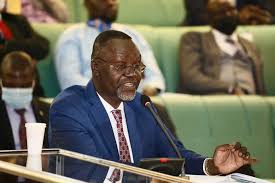Parliament has amended its Rules of Procedure to introduce elections for the four backbench commissioners, replacing the current system where political parties appoint them. This move is aimed at giving Members of Parliament (MPs) more control over the selection process and reducing the influence of party leaders in determining who represents them on the Parliamentary Commission.
The reforms were proposed by the House Committee on Rules, Privileges, and Discipline, chaired by Hon. Abdu Katuntu, who emphasized the need for MPs to elect their representatives rather than having them imposed by political party structures.
“When we put this process, it’s for the members to have a say in choosing their representative backbenchers, since the Executive is ably catered for,” Katuntu explained during the plenary session on Tuesday, February 18, 2025.
Previously, the backbench commissioners were appointed based on a ratio of three to one, with three positions allocated to the ruling party and one to the opposition. However, under the new system, candidates will be nominated and elected by Parliament through a structured process.
According to the amended rules, the Clerk to Parliament will notify MPs about the nomination date within two days of the first sitting of a new Parliament or at least 14 days before the current commissioners’ term expires. The government side will nominate six candidates, while the opposition will nominate three, all of whom will be subjected to a vote in Parliament.
While the reforms aim to promote transparency and inclusivity, they sparked debate among MPs, with some arguing that the changes could be unfair and limit broader participation.
Kampala Central MP, Hon. Mohammed Nsereko, criticized the amendments, arguing that every MP should have an equal opportunity to compete for a position on the commission.
“If we are talking about the commission, let us leave it to everyone to present their credentials to be selected to the commission, since we all come here to represent the people,” Nsereko said.
He further warned against “raising the autocracy of parties” by giving them too much control over the nomination process, which could disenfranchise independent-minded MPs.
Butambala County MP, Hon. Muwanga Kivumbi, raised concerns about the assumption that the ruling party will always have a stable majority. He pointed out that in a scenario where Parliament is evenly split between the government and opposition, the requirement to nominate six and three candidates respectively could become impractical.
“We could get a hung Parliament, where literally the difference between the government side and the opposition is too slim, or even if it is fifty-fifty, where will you get the numbers of six?” Kivumbi questioned.
However, Attorney General Hon. Jackson Kafuzi defended the new rules, explaining that they ensure the majority side has more representation in line with parliamentary procedures and budgeting considerations.
“The rules together with the law provide for the bigger number to take more numbers of the commission and for the simple reason of budgeting and welfare,” Kafuzi said.
The Leader of the Opposition, Hon. Joel Ssenyonyi, suggested further revisions to the process. He proposed allowing both sides to nominate more candidates rather than restricting the numbers to six and three.
“Let the government side and the opposition side do the same because when you say that all must be voted, it disenfranchises the side that these people are seeking to represent,” Ssenyonyi argued.
Additionally, he recommended that each side elects its own representatives instead of having the entire House vote on them.
As part of the broader reforms, Parliament also approved the creation of four new committees, including the Committee on Subsidiary Legislation. Furthermore, three existing sectoral committees were split into two each to enhance efficiency and oversight in key government sectors.
The Natural Resources Committee was divided into:
- Water and Environment Committee
- Energy, Minerals, and Petroleum Committee
The Physical Infrastructure Committee was split into:
- Works and Transport Committee
- Lands, Housing, and Urban Development Committee
The Trade, Tourism, and Industry Committee was separated into two independent committees to focus on their specific mandates.
These changes are expected to streamline parliamentary business by ensuring that committees handle more specialized subject matters rather than dealing with broad areas under a single unit.
The amendment of the rules marks a significant shift in how the Parliamentary Commission is constituted. By allowing MPs to elect commissioners, Parliament aims to strengthen democracy within its structures and reduce party influence. However, concerns remain over how the nomination process will be managed to ensure fairness and representation for all MPs.
The restructuring of committees is also expected to improve parliamentary oversight and efficiency, particularly in critical sectors such as energy, transport, and urban development.





